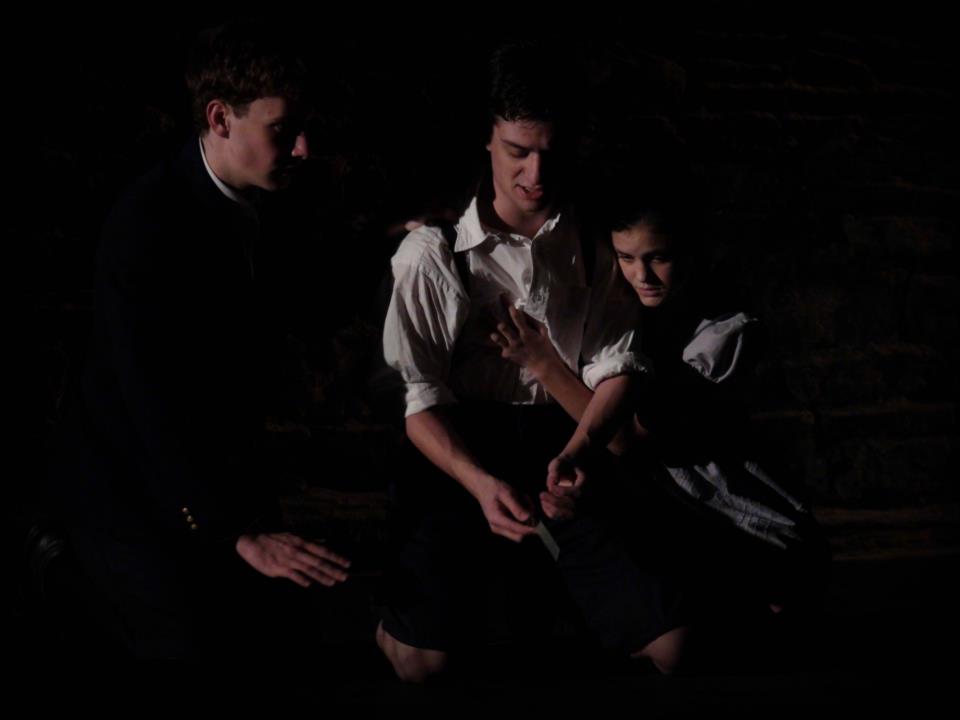
Blank slate theatre’s all-youth cast delivers a mindfully transgressive and soulful “Spring Awakening”
Pictured: Hanna Sprout and Ryan Levin as the young lovers Wendla and Melchior. Photo by Bailey Anderson
I saw a remarkable play in the basement of St. Paul’s First Baptist Church late last week: blank slate theatre’s all-youth production of the multiple-Tony-winning musical, “Spring Awakening.” There are just four performances left, and let me say, right off the bat: I really think you ought to go see it, too. The show blends a rock opera-worthy score with the story of late 19-century German adolescents; the tale centers on a handful of small-town teenagers variously caught in the throes of burgeoning desires and anxieties they can neither name nor understand, much less manage. It’s a musical re-working of the satirical play written by Frank Wedekind in 1891, skewering religious dogmatism and provincial mores about gender, sex and the relationship between adults and children. Wedekind’s original script scandalized audiences of his time – it was banned in Europe for many years – and, honestly, I can see why. It’s provocative, even by current-day standards. “Spring Awakening” presents a (sometimes startlingly) frank depiction of nascent sexuality, and the accompanying perils of the youthful ignorance and prim adult denial that too often surround it. From masturbation and erotically charged dreams to incest and abortion and all manner of sexual encounters (of the same-sex, heterosexual, and light S&M varieties) – the play embraces the shaggy ardors of teenage sexual yearning and exploration with verve and candor.
The musical numbers are whip-smart, lyrically, and uniformly catchy. The songs are sometimes poignant, sometimes funny, often downright defiant – particularly so here, in the mouths of bona fide teenagers. In fact, the all-youth casting lends the whole production an added frisson of authenticity and dramatic tension, and for the adults in the room watching (many of them friends and family of the cast the night I attended), a persistent twinge of discomfort as well. Perhaps that’s because the intensity, sexual and otherwise, on stage doesn’t feel at all simulated. These aren’t grown-ups playing at being teenagers; there’s no ironic winking going on behind the youthful sturm und drang of the characters. Instead every moment of performance feels anchored in the immediacy of real, lived teenaged experience – informed by what happened in high school hallways yesterday, rather than something remembered from ten years ago.
The intensity and intimacy of blank slate’s iteration of the show is made all the more so by the production’s promenade-style staging: but for a bare handful of chairs set up along the perimeter for those who’d like an occasional break from standing, audience members and cast share an open performance space. Actors move from spotlit section to spotlit section to enact their scenes; sometimes the cast actually surrounds the audience. We simply moved aside as needed to allow the cast room to move between and among us. This way of watching wasn’t just intimate, but close: I inadvertently jostled fellow audience members, even occasionally brushed an actor passing by, as I milled around to better see the action. I was acutely aware of my body moving gracelessly in the space with all these others – self-conscious and desperately hoping not to trip on something, unsure where to stand or how to be without the usual demarcations of audience and stage in place. I found myself at once riveted by and exquisitely uncomfortable with the naked sexual yearning on display not five feet from me, in a church basement. And all that awkwardness took me right back to my own 14 year-old self – specifically, to another church basement in the middle of the night one weekend in the winter of my freshman year, at a lock-in held by my deeply conservative Southern Baptist youth group, surrounded by a bunch of sweetly earnest, painfully self-conscious, horny kids; I keenly recall a stolen moment in the arms of my 16-year-old crush, thunderstruck by inchoate guilt and the double-whammy of his shirtlessness and the bewitching scent of his Polo for Men.
All of which made these characters’ evolving circumstances – their heartbreaks and epiphanies and ardent unions – that much more compelling. In this pared-down production, there are no microphones, no elaborate sets – just a live band behind a curtain, clever lighting design, strong direction by company founder Adam Arnold and some spectacularly talented teenagers fearlessly, earnestly performing their hearts out.
We’ve seen a number of productions of “Spring Awakening” in the Twin Cities over the last year, from the Broadway touring production to Theater Latte Da’s Ivey Award-winning staging of the play last spring. But no matter. What blank slate theatre’s young performers are doing in that church basement is something fresh, in a different category entirely from all that. This isn’t a slickly polished production; some of the seams show here and there, but that’s just fine. All told, the ensemble pulls off the play’s challenging roles superbly, with performances that are raw and soulful and mindfully transgressive.
Go see this production while you can – it’s an unexpectedly affecting, simply gorgeous night of theater.
blank slate theatre’s production of “Spring Awakening” is distinguished by three stand-out performances by its leads (R to L): Eli Newell (as Moritz), Ryan Levin (as Melchior) and Hanna Sprout (as Wendla). Photo by Bailey Anderson
“Spring Awakening” by blank slate theatre continues through this weekend with shows Thursday (7:30 p.m.), Friday (7:30 p.m.) and Saturday (2 p.m., 7:30 pm), in the basement of the First Baptist Church, 499 Wacouta Street, St. Paul. For ticket information, visit: http://www.brownpapertickets.com/event/254546. (Act quickly if you’re interested in going; tickets are limited, and I hear they’re selling out fast.) For more about blank slate theatre, visit: http://www.blankslatetheatre.com/home.html.
Recent Content
-
Artsarticle ·
-
Artsarticle ·
-
Artsarticle ·


